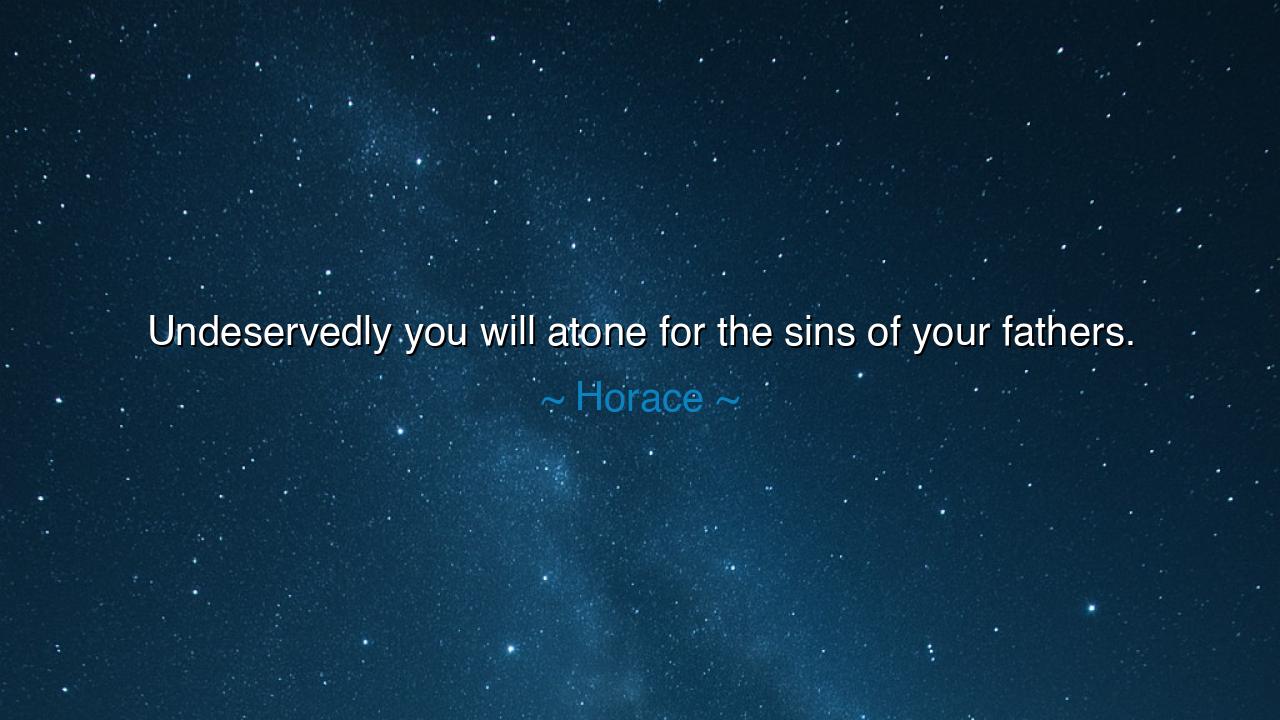
Undeservedly you will atone for the sins of your fathers.






The ancient poet Horace, in his piercing wisdom, once wrote: “Undeservedly you will atone for the sins of your fathers.” These words echo across the centuries like the tolling of a solemn bell, warning those who listen that the deeds of one generation are never buried with their bodies. They live on—in the soil, in the air, in the hearts of their children. This quote is no curse, but a truth of inheritance: that we, though innocent, carry the weight of what was done before us, and must either redeem or repeat the legacy of our forebears.
Horace lived in a Rome trembling between grandeur and ruin, a civilization born of conquest yet burdened by its own excess. His words were not the lament of a fatalist, but the insight of one who saw how the errors of fathers—greed, pride, neglect of virtue—cast long shadows across the lives of sons. The ancients understood this deeply: that history, like blood, flows through us whether we will it or not. The sins of the fathers are not always crimes of malice; sometimes they are the quiet failures of wisdom, the blindness to consequence, the comfort that breeds decay. To atone undeservedly is the burden of those who inherit both the gifts and the debts of time.
Look to the story of Germany after the Second World War, a nation forced to bear the moral wreckage of its fathers. The children who came after did not choose the horrors of war, nor the cruelty of tyranny, yet they lived beneath its shadow. They rebuilt not only their cities but their conscience. Through remembrance, education, and repentance, they sought redemption for a past they did not create. This, too, is Horace’s lesson: that though we may atone without guilt, we atone nonetheless—because to deny responsibility for the world we inherit is to abandon the future itself.
The words of Horace also carry a universal warning: that no action ends with its actor. The choices of the present become the conditions of the next age. When the earth is scorched, it is the children who breathe the ashes; when justice is neglected, it is the innocent who live under its absence. Thus, the wise live with reverence toward the generations yet unborn. They plant trees whose shade they will never see, and cleanse wounds they did not inflict. For the chain of history is unbroken, and atonement is the bridge between the past and the future.
But let not these words breed despair. For if we inherit the sins of our fathers, we also inherit their strength, courage, and wisdom. The same blood that carried folly also carries the power to heal it. Every act of goodness, every moment of truth, every effort toward justice ripples forward as surely as sin once did. To live well, then, is to become the redeemer of one’s lineage, to transform the weight of inherited wrongs into a foundation for a nobler age.
Horace speaks through the centuries not to condemn, but to awaken. He reminds us that responsibility does not begin with guilt, but with awareness. It is not enough to say, “I did not cause this.” The true question is, “Will I leave it as I found it?” The ancient sage would say that every soul is born into a story already in motion, and it is the duty of the living to guide that story toward justice, toward balance, toward the light.
So, dear listener, take this teaching to heart: do not turn away from the shadows of your past, whether personal or ancestral. Acknowledge them, learn from them, and redeem them. Build where others destroyed. Heal where others wounded. Teach where others silenced truth. In doing so, you will fulfill the sacred cycle of restoration. Remember Horace’s wisdom: though you may atone undeservedly, you also restore undeservedly—and in that restoration lies the power to free not only yourself, but generations yet to come.






AAdministratorAdministrator
Welcome, honored guests. Please leave a comment, we will respond soon